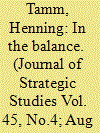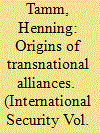| Srl | Item |
| 1 |
ID:
186100


|
|
|
|
|
| Summary/Abstract |
The two main rebel groups in the Second Congo War (1998–2003) evolved in remarkably different ways. While the MLC maintained organisational cohesion throughout the war, the RCD split into two rival groups within less than a year. The larger of these rivals then remained cohesive, whereas the smaller group experienced further fragmentation. This article draws on interviews with key protagonists to show that these cross-group differences resulted from different patterns of state sponsorship. Fragmentation occurred when the intra-group distribution of power between a rebel leader and an internal rival hung in the balance because external troops supported both sides.
|
|
|
|
|
|
|
|
|
|
|
|
|
|
|
|
| 2 |
ID:
147048


|
|
|
|
|
| Summary/Abstract |
Despite their catastrophic proportions, the Congo Wars have received little attention from international relations scholars. At the heart of these conflicts were alliances between rebel groups and neighboring rulers. What are the origins of such transnational alliances, which have been a major feature of nearly all civil wars in post–Cold War Africa? Recent scholarship on external support for rebel groups does not offer a clear answer, either providing long lists of the goals that state sponsors may have or avoiding the question of motives altogether. A focus on political survival reveals that African rulers form alliances with rebels in nearby states to reduce the threats of rebellions and military coups that the rulers themselves face at home. Transnational alliances serve either to weaken a ruler's domestic enemies by undermining their foreign sponsors or to ensure the continued allegiance of key domestic supporters by providing them with opportunities for enrichment. Case studies of the alliance decisions made in the two Congo Wars by the rulers of Angola, Rwanda, Sudan, Uganda, and Zimbabwe show that their struggles for political survival account for why they sided either with their Congolese counterparts or with Congolese rebels.
|
|
|
|
|
|
|
|
|
|
|
|
|
|
|
|
| 3 |
ID:
151271


|
|
|
|
|
| Summary/Abstract |
Civil wars often feature insurgent groups with external sponsors. Yet, we know little about the impact of such sponsorship on insurgent cohesion. Indeed, researchers disagree about the conditions under which state sponsorship encourages or discourages organizational splits. This article presents a theory that reconciles these disagreements. I focus on how the allocation of external resources affects the intra-group distribution of power between rebel leaders and their internal rivals. Sponsors that help maintain an imbalance of power in favor of the leader foster cohesion; those that help flip the imbalance in favor of a rival increase the likelihood of an internal coup within the group. Only when sponsors contribute to a shift from an imbalance of power to balanced power is the rebel group more likely to split into competing organizations. I further argue that sponsors reallocate their resources in favor of a rebel leader’s internal rival in order to punish the leader for undesired behavior. Case studies of two major insurgent groups—the Sudan People’s Liberation Movement/Army and the Lebanese Hezbollah—illustrate the explanatory power of my argument.
|
|
|
|
|
|
|
|
|
|
|
|
|
|
|
|
| 4 |
ID:
168272


|
|
|
|
|
| Summary/Abstract |
Yoweri Museveni’s rebels seized power in Uganda in 1986, with Rwandan refugees making up roughly a quarter of his troops. These refugees then took power in Rwanda in 1994 with support from Museveni’s regime. Subsequently, between 1999 and 2000, the Rwandan and Ugandan comrades-in-arms turned on each other in a series of deadly clashes in the Democratic Republic of Congo, a country they had invaded together only one year earlier. What explains these fratricidal clashes? This article contends that a social–psychological perspective focused on status competition between the Rwandan and Ugandan ruling elites provides the most compelling answer. Long treated as ‘boys’, the new Rwandan rulers strove to enhance their social status vis-à-vis the Ugandans, seeking first equality and then regional superiority. Economic disputes over Congo’s natural resources at times complemented this struggle for status but cannot explain all of its phases. The article draws on interviews with senior Rwandan, Ugandan, and former Congolese rebel officials, and triangulates them with statements given to national and regional newspapers at the time of the clashes. More broadly, it builds on the recently revitalized study of status competition in world politics and makes a case for integrating research on inter-African relations.
|
|
|
|
|
|
|
|
|
|
|
|
|
|
|
|